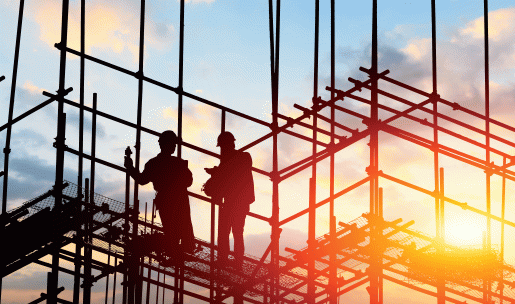
Housebuilding was the weakest-performing area of construction activity for the fourth month running in June, registering the first overall downturn in residential work in almost two years, according to the S&P Global/CIPS UK Construction Purchasing Managers’ Index.
The housing sector posted a reading of 49.3 last month, below the 50.0 no-change mark, signalling the first fall in residential work since May 2020.
Chartered Institute of Procurement & Supply group director Duncan Brock says: “Residential building levels fell for the first time since May 2020, and builders are getting an increasingly stark vision of the marketplace they are now operating in as overall activity growth also fell sharply.”
Across the industry, construction posted a 52.6 reading in June, above the no-change mark for the seventeenth consecutive month, but this was the slowest rate of expansion since September 2021.
The report comes after the Bank of England has raised interest rates five times in the row since December to 1.25%, and inflation hit 9.1% in May, a 40-year high. Many economists forecast the UK will fall into recession over the next 12 months.
Civil engineering was the most resilient sub-sector in June, at 54.3, down only slightly from 55.5 in May, according to the construction report. Work in the commercial sector saw its rate of growth ease sharply to its slowest so far this year to 54.3, from 59.8 in May.
The report says the growth in overall new orders last month softened to its weakest rate since October 2021.
It adds: “Some construction companies noted a lack of new work to replace completed projects due to economic uncertainty and inflation concerns.”
The study says 71% of its panel reported higher purchasing prices in June, while only 1% signalled a reduction, with “higher prices paid mostly reflecting rising energy, fuel and transportation costs”.
It adds that business optimism was at its lowest since July 2020.
“Weaker business confidence has now been recorded for five months running, largely reflecting subject growth expectations for the UK economy, alongside uncertainty about the impact of higher interest rates and escalating inflationary pressures,” says the survey.
S&P Global Market Intelligence economics director Tim Moore says: “The gloomy UK business outlook and worsening consumer demand due to the cost of living crisis combined to put the brakes on construction growth in June.
“Housebuilding has expanded more quickly than the rest of the construction sector over the course of the pandemic, but now finds itself as the worst-performing broad category so far in 2022. Moreover, the latest survey indicated an outright decline in residential work for the first time in just over two years.
“Construction companies appear braced for a difficult second half of the year as new order growth and business activity expectations fell again in June, reflecting inflation concerns, higher interest rates and less favourable domestic economic conditions.”
Naismiths director of national property Gareth Belsham adds: “Housebuilders, once the poster children of Britain’s post-pandemic construction boom, have been at the back of the class for four months in a row. Residential construction is now contracting for the first time since the darkest days of the first lockdown in 2020.
“Housebuilding is more directly exposed to consumer confidence than any other construction sector; and it’s clear that some residential developers are easing off the gas pedal in response to the slowing economy and the rising cost of mortgages.
“While output is still climbing in infrastructure and commercial property building, the pace is slowing steadily – and overall expansion is now weaker than it has been at any time since last September.
“With some firms struggling to find new orders to replace completed work, business confidence is starting to flail – and it has now fallen for five months in a row. Barely a third of construction firms expect business activity to rise in coming months, with sentiment a shadow of what it was during last year’s surge in work.
“Nevertheless many contractors are actively recruiting new staff – a hint at optimism for the future – and while the prices of raw materials are still rising painfully fast, availability is improving and project delays are easing.
“The first half of 2022 has been challenging to say the least, and with the twin risks of inflation and insolvency looming ever larger, the second half could be even tougher.”



